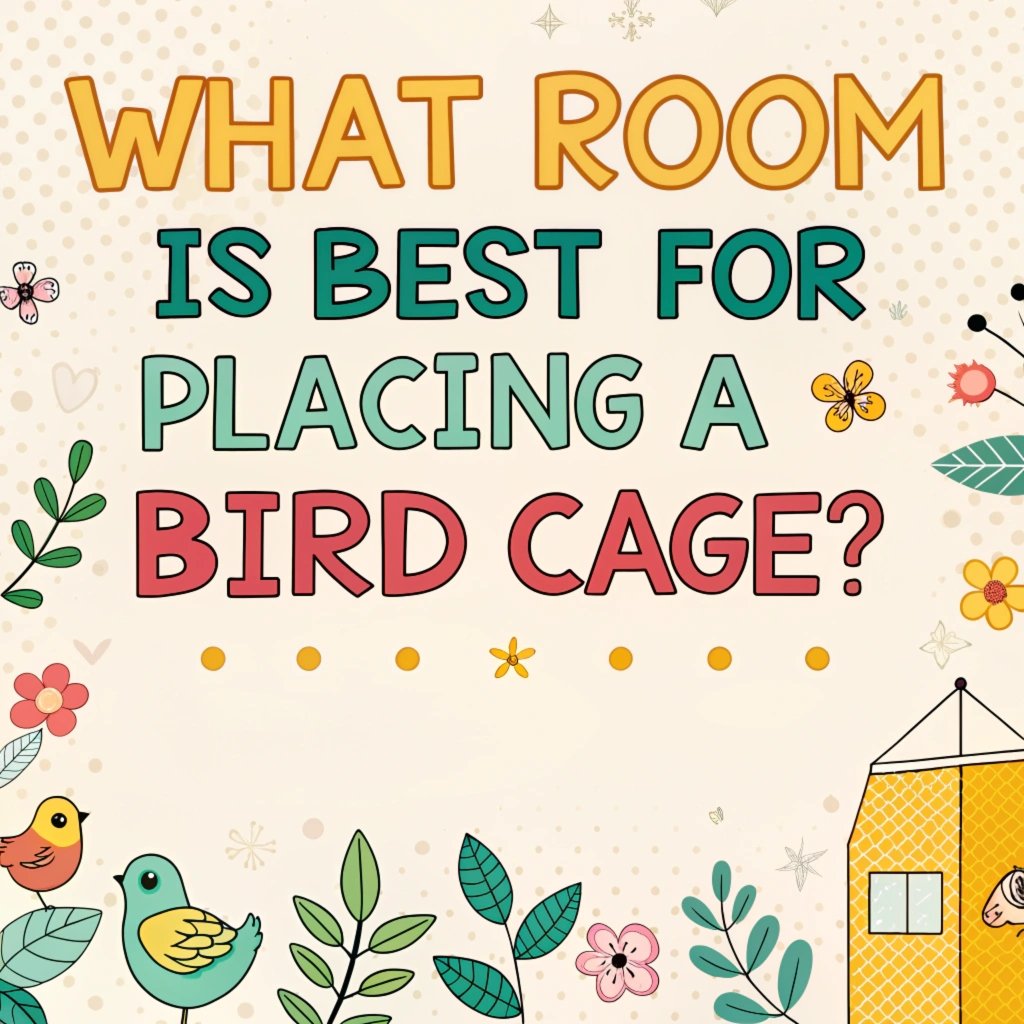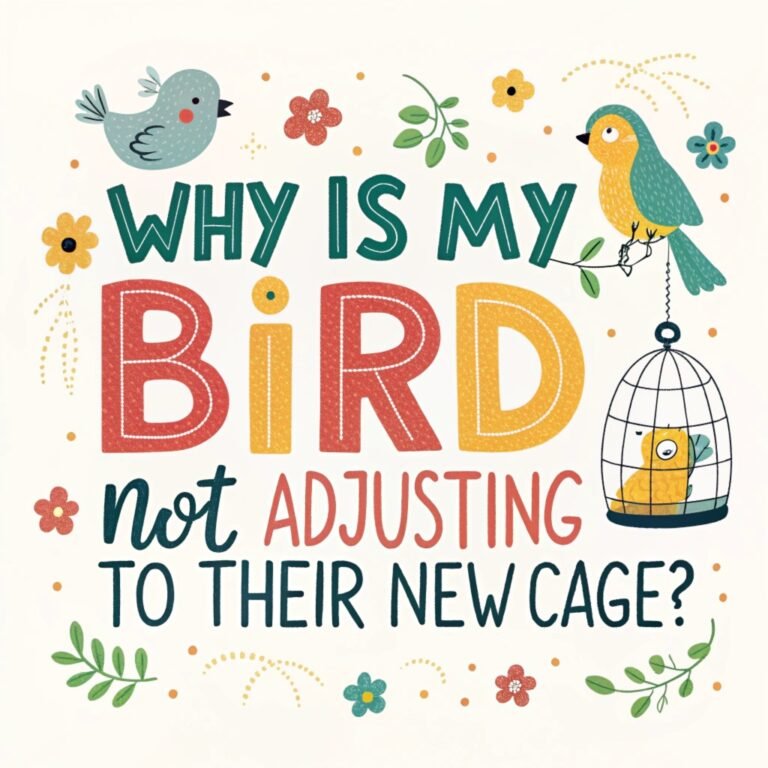What Room Is Best For Placing A Bird Cage? – A Comprehensive Guide
Welcome to the world of bird care! If you’re a proud bird owner or planning to become one, understanding the best room for placing a bird cage is crucial.
Birds are not just pets; they are companions that thrive in environments that cater to their physical and emotional needs.
Choosing the right room for your bird’s cage can significantly impact their happiness and health.
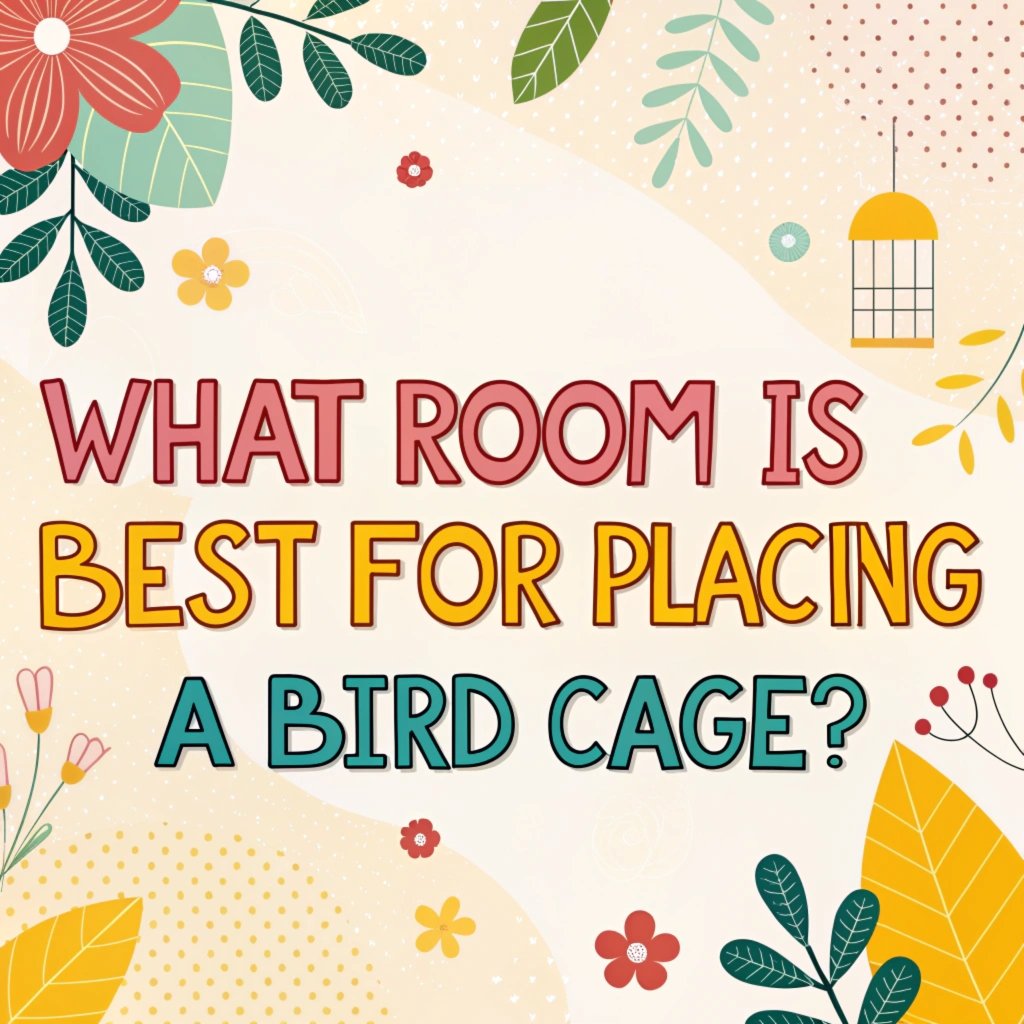
Key Takeaways:
- Birds require a balance of social interaction and privacy. Placing the cage in a room where family members frequently gather can enhance your bird’s social life.
- Temperature and ventilation are critical. Ensure the room is well-ventilated and maintains a stable temperature to keep your bird comfortable.
- Natural light is beneficial but avoid direct sunlight. Position the cage to receive indirect sunlight, which helps regulate your bird’s natural rhythms.
- Safety is paramount. Avoid placing the cage near windows, doors, or areas with heavy foot traffic to prevent stress and potential accidents.
- Noise levels should be moderate. Birds have sensitive hearing, so choose a room with a consistent noise level that won’t startle them.
- Room size matters. Ensure the room is spacious enough to accommodate the cage and allow for easy movement around it.
- Avoid drafts and sudden temperature changes. Keep the cage away from air conditioning vents, heaters, and drafty areas.
- Consider the bird’s species-specific needs. Different birds have unique requirements, so tailor the cage placement to suit your bird’s specific needs.
Understanding Your Bird’s Needs
When it comes to choosing the ideal room for your bird cage, it’s essential to first understand your feathered friend’s needs.
Birds are complex creatures with specific requirements for their physical and emotional well-being. They need a balance of stimulation and security, which can be achieved through thoughtful cage placement.
Consider your bird’s natural habitat and try to mimic those conditions as closely as possible within your home. Some birds prefer quieter environments, while others thrive in more active areas.
Observe your bird’s behavior and adjust the cage location if necessary. Remember that birds are social animals and often enjoy being part of the family’s daily activities.
However, they also need periods of rest and privacy. By understanding these fundamental needs, you’ll be better equipped to select the perfect room for your bird’s cage, ensuring a happy and healthy life for your avian companion.
The Importance of Cage Placement
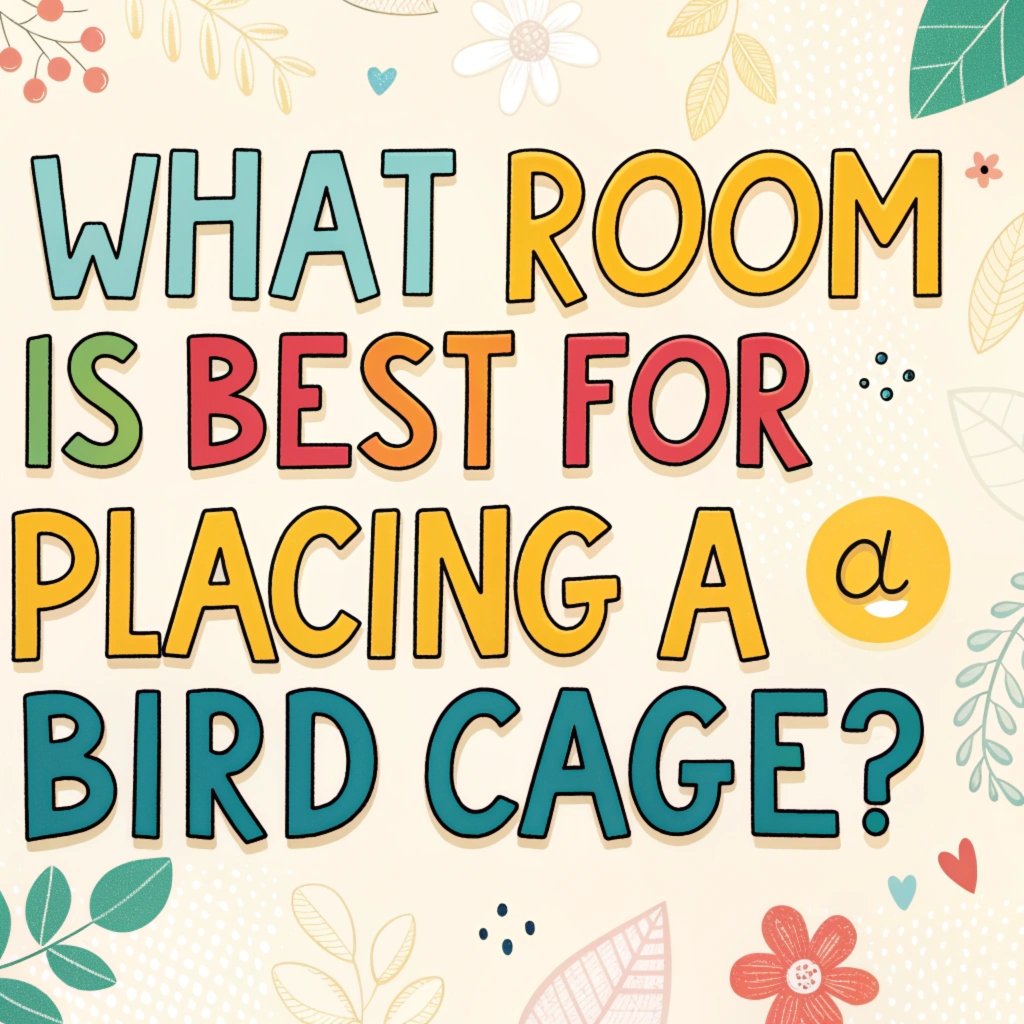
The placement of your bird’s cage is more than just a matter of convenience or aesthetics; it’s a crucial factor in your pet’s overall well-being.
Proper cage placement can significantly impact your bird’s physical health, mental stimulation, and emotional security.
A well-placed cage provides your feathered friend with the right balance of social interaction and quiet time, helping to prevent stress-related behaviors and promote natural activities.
It also affects your bird’s exposure to environmental factors such as light, temperature, and air quality, which are vital for maintaining good health.
Additionally, the right placement can facilitate bonding between you and your bird, making it easier for you to interact with and care for your pet.
On the other hand, poor cage placement can lead to various issues, including anxiety, feather plucking, and even health problems.
By carefully considering where to place your bird’s cage, you’re taking an important step in providing a safe, comfortable, and enriching environment that will contribute to your bird’s longevity and quality of life.
Factors to Consider When Choosing a Room
When selecting the ideal room for your bird cage, several key factors should be taken into account.
First, consider the room’s temperature and humidity levels. Birds are sensitive to extreme temperatures, so choose a room where you can maintain a consistent, comfortable climate. The lighting in the room is another crucial factor.
Natural light is beneficial for birds, but avoid placing the cage in direct sunlight, which can cause overheating.
Noise levels should also be considered; while birds enjoy some background noise, excessive or sudden loud noises can be stressful.
The size of the room matters too – it should be spacious enough to accommodate the cage and allow for out-of-cage playtime.
Air quality is essential, so avoid rooms with strong odors or where cleaning products are frequently used.
Consider the room’s location within your home – it should be easily accessible for daily care and interaction. Lastly, think about the room’s overall atmosphere. A calm, peaceful environment will contribute to your bird’s sense of security and well-being.
Safety and Security for Your Bird
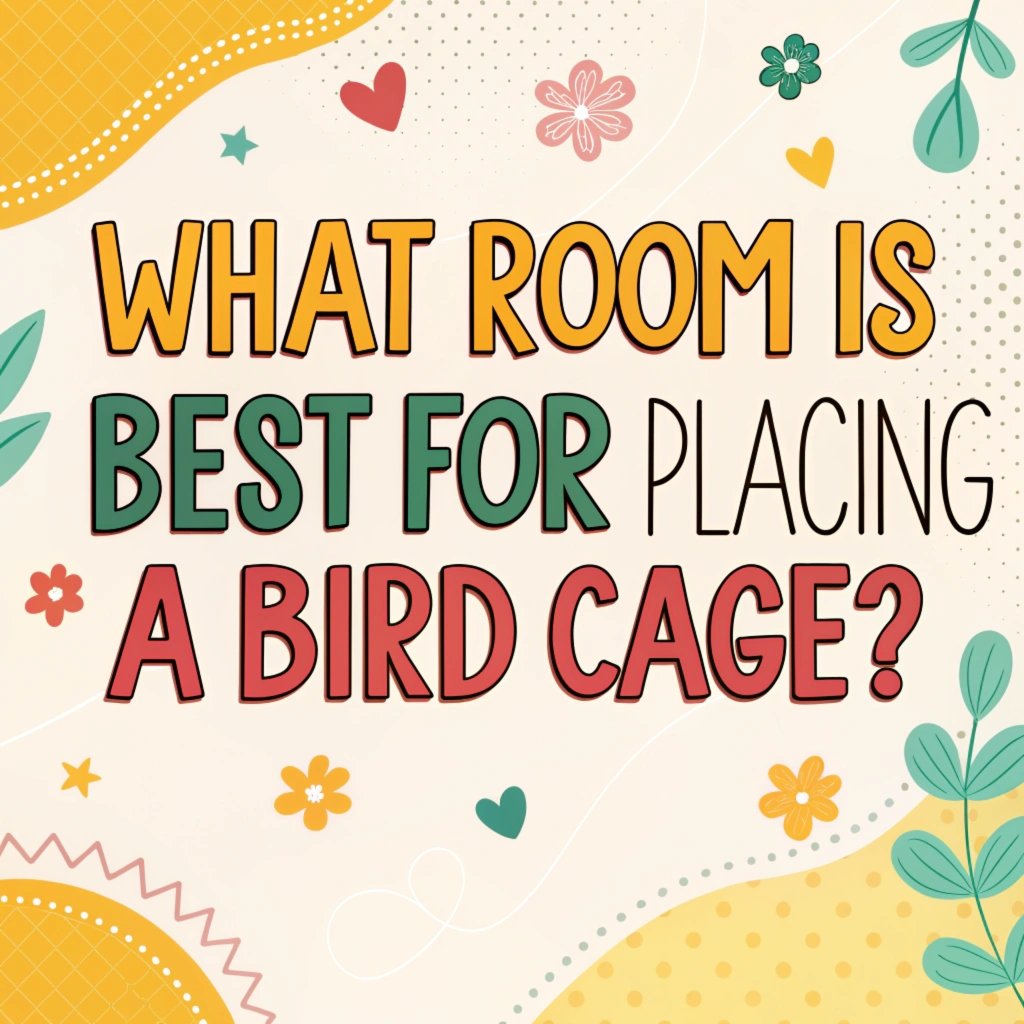
Ensuring the safety and security of your feathered friend should be a top priority when choosing a room for their cage. The ideal location should be free from potential hazards that could harm your bird.
Avoid placing the cage near windows or doors that are frequently opened, as drafts can be harmful to your bird’s health. Keep the cage away from areas with heavy foot traffic to prevent accidental bumps or knocks that could startle your bird.
Be mindful of other pets in the household; ensure the bird’s cage is in a location where they can’t be reached by cats or dogs.
Toxic plants, if present in your home, should be kept far from the bird’s living area. Consider the height at which you place the cage – it should be at eye level or slightly below to make your bird feel secure.
Avoid placing the cage in areas where cleaning products or aerosols are frequently used, as these can be harmful if inhaled.
Electrical cords should be kept out of reach to prevent chewing. By carefully assessing and eliminating potential safety risks, you create a secure environment where your bird can thrive.
Temperature and Ventilation Considerations
Temperature and ventilation play crucial roles in maintaining your bird’s health and comfort. Birds are sensitive to temperature fluctuations, so it’s essential to choose a room where you can maintain a consistent, comfortable temperature.
The ideal temperature range for most pet birds is between 65°F and 75°F (18°C to 24°C). Avoid placing the cage near heating or cooling vents, as direct airflow can cause drafts and sudden temperature changes that stress your bird.
Good ventilation is equally important to ensure a steady supply of fresh air and prevent the buildup of harmful fumes or dust. However, be cautious of open windows that might create strong drafts.
Consider using a thermometer in the room to monitor temperature fluctuations throughout the day.
In warmer months, ensure the room has adequate cooling options, such as fans or air conditioning, but never direct these directly at the cage.
During colder periods, avoid placing the cage near radiators or space heaters.
By carefully managing temperature and ventilation, you create a stable, comfortable environment that supports your bird’s overall well-being and helps prevent respiratory issues.
Social Interaction and Noise Levels
Social interaction is vital for your bird’s mental and emotional well-being, making it an important factor in choosing the right room for their cage.
Birds are highly social creatures that thrive on interaction with their human family members.
Placing the cage in a room where family activities often occur, such as a living room or family room, can provide your bird with the social stimulation they need. However, it’s crucial to balance social interaction with periods of quiet.
While birds enjoy being part of the family’s daily life, constant noise and activity can be stressful. Consider a room that has a mix of busy and quiet times throughout the day.
Be mindful of noise levels in the chosen room. Birds have sensitive hearing, and loud, sudden noises can be frightening.
Avoid rooms near noisy appliances or where the TV or music is played at high volumes. If the room tends to get noisy, ensure there’s a quiet corner where your bird can retreat.
Remember, different bird species have varying social needs, so research your specific bird’s requirements.
By providing the right balance of social interaction and peaceful moments, you’ll help your bird feel secure and content in their environment.
Natural Light and Visibility
Natural light plays a significant role in your bird’s health and well-being, making it an important consideration when choosing a room for their cage.
Birds benefit from exposure to natural light as it helps regulate their circadian rhythms, influences their molting cycles, and aids in vitamin D synthesis.
When selecting a room, look for one with windows that allow natural light to filter in throughout the day.
However, it’s crucial to avoid placing the cage in direct sunlight, which can cause overheating and discomfort.
Instead, position the cage where it receives indirect natural light. This could be near a window with sheer curtains or in a bright corner of the room.
Consider the direction the windows face – north-facing windows provide consistent, gentle light throughout the day. In terms of visibility, birds feel more secure when they can observe their surroundings.
Place the cage where your bird can see the room’s entrance and any windows, but ensure there’s also a side of the cage that provides a sense of security, such as against a wall.
This setup allows your bird to feel safe while still being able to monitor their environment.
By carefully considering natural light and visibility, you create an environment that supports your bird’s natural behaviors and instincts.
Avoiding Drafts and Direct Sunlight
Avoiding drafts and direct sunlight is crucial when choosing the perfect room for your bird’s cage. Birds are highly sensitive to air currents and temperature changes, making drafts particularly problematic.
Drafts can cause discomfort and even lead to health issues such as respiratory problems. When selecting a room, be mindful of potential sources of drafts, such as windows, doors, air conditioning vents, and fans.
Position the cage away from these areas to ensure your bird is protected from sudden air movements. While natural light is beneficial, direct sunlight can be harmful to your feathered friend.
Prolonged exposure to direct sunlight can cause overheating and dehydration, especially in smaller birds. It can also fade your bird’s feathers and potentially cause eye damage. Choose a room where you can control the amount of sunlight that reaches the cage.
Use curtains or blinds to filter strong sunlight during the hottest parts of the day. If the room tends to get warm, consider using UV-blocking window film to reduce heat and harmful rays.
By carefully managing drafts and sunlight exposure, you create a stable, comfortable environment that supports your bird’s health and well-being.
Room Size and Space Requirements
The size of the room and available space are crucial factors to consider when placing your bird’s cage. Birds need ample space not just for their cage, but also for out-of-cage activities and exercise.
A larger room allows for a more spacious cage and provides room for perches, toys, and play areas outside the cage.
When assessing room size, consider your bird’s species and natural behaviors. Larger birds or those that are particularly active will benefit from more space.
The room should be large enough to accommodate the cage comfortably while leaving space for you to move around easily for cleaning and interaction.
Ceiling height is also important, especially for birds that enjoy flying or climbing. A room with a higher ceiling can accommodate tall cages or allow for the installation of ceiling-mounted perches or play gyms.
Consider the layout of the room as well. Ensure there’s enough space to open cage doors fully and for your bird to have a clear flight path if they’re allowed out of the cage.
Remember to factor in space for food storage, cleaning supplies, and any additional equipment your bird might need.
By choosing a room with adequate size and space, you provide your bird with an environment that supports their physical and mental well-being.
Common Mistakes in Bird Cage Placement
When it comes to bird cage placement, there are several common mistakes that bird owners should be aware of and avoid. One of the most frequent errors is placing the cage in a kitchen.
While it might seem convenient, kitchens can be dangerous due to fumes from non-stick cookware, which can be toxic to birds. Another mistake is positioning the cage too close to windows.
While natural light is beneficial, direct exposure to sunlight can cause overheating, and drafts from windows can lead to health issues.
Many owners also make the mistake of placing the cage in a room that’s too isolated. Birds are social creatures and need interaction, so a completely secluded room can lead to loneliness and behavioral problems.
Conversely, placing the cage in an overly busy or noisy area of the house can cause stress and anxiety.
Some bird owners underestimate the importance of room temperature, placing cages near heating or cooling vents, which can create uncomfortable temperature fluctuations.
Another common error is positioning the cage at an inappropriate height – either too low, making the bird feel vulnerable, or too high, making daily care difficult.
Lastly, neglecting to secure the cage properly can lead to accidents if the cage is knocked over.
By being aware of these common mistakes, you can ensure a safer, more comfortable environment for your feathered friend.
Tips for Creating a Comfortable Environment
Creating a comfortable environment for your bird goes beyond just choosing the right room. Start by ensuring the cage itself is appropriate for your bird’s size and species.
The cage should be large enough for your bird to spread its wings fully and move around comfortably. Proper perches are essential – provide a variety of sizes and textures to keep your bird’s feet healthy.
Toys and enrichment items are crucial for mental stimulation; rotate them regularly to keep your bird engaged.
Consider the layout of the room – arrange furniture to allow for safe out-of-cage time and flying space if appropriate for your bird.
Lighting is important; while natural light is beneficial, ensure your bird has a consistent day-night cycle, using covers or dimming lights in the evening. Temperature control is vital; use thermometers to monitor the room’s temperature and humidity levels.
Air quality should be a priority; avoid using air fresheners or scented candles near your bird’s cage. Background noise can be comforting for birds; consider playing soft music or nature sounds.
Cleanliness is crucial; maintain a regular cleaning schedule for the cage and surrounding area. Lastly, personalize the space – some birds enjoy mirrors or pictures of other birds.
By paying attention to these details, you can create a nurturing, stimulating environment that promotes your bird’s physical and emotional well-being.
FAQs
What is the ideal room temperature for a bird cage?
The ideal room temperature for most pet birds ranges between 65°F and 75°F (18°C to 24°C). It’s important to maintain a consistent temperature and avoid sudden fluctuations. Always monitor the room temperature and adjust as needed, especially during extreme weather conditions.
Can I place my bird cage near a window?
While natural light is beneficial for birds, placing the cage directly next to a window can be problematic. Windows can create drafts and temperature fluctuations, and direct sunlight can cause overheating. It’s better to place the cage in a bright room but away from direct window exposure.
Is it okay to keep a bird cage in the bedroom?
Keeping a bird cage in the bedroom can be suitable, provided the room meets all the necessary requirements for temperature, lighting, and air quality. However, be aware that birds can be noisy in the early morning, which might disrupt your sleep. Also, ensure the bird has enough social interaction throughout the day.
How far should a bird cage be from a TV or stereo?
It’s best to keep the bird cage at a moderate distance from TVs and stereos. While some background noise can be stimulating for birds, loud or sudden noises can be stressful. A distance of about 6-10 feet (2-3 meters) is generally suitable, but observe your bird’s reactions and adjust accordingly.
Can I place my bird cage in a room with other pets?
Placing a bird cage in a room with other pets requires careful consideration. While some birds and pets can coexist peacefully, others may cause stress or pose a danger to your bird. Always supervise interactions between birds and other pets, and ensure the cage is secure and out of reach of other animals.
How often should I change the location of my bird’s cage?
Birds generally prefer consistency in their environment. Frequent changes in cage location can cause stress. However, if you need to move the cage, do it gradually over a few days if possible. Once you find an ideal spot that meets all your bird’s needs, it’s best to keep the cage in that location.
Is it safe to keep a bird cage in a carpeted room?
Carpeted rooms can be suitable for bird cages, but they require extra attention to cleanliness. Carpet can trap dander, feathers, and food particles, which can lead to bacterial growth. Regular vacuuming and occasional deep cleaning are essential. Consider placing a mat under the cage for easier cleaning.
How much space should be around the bird cage?
Ideally, there should be at least 1-2 feet (30-60 cm) of clear space around all sides of the cage. This allows for good air circulation, makes cleaning easier, and provides space for perches or play stands outside the cage.

Hello, I’m Amelia White, the founder of birdsfanatic.com. As a lifelong bird enthusiast and spiritual seeker, I’ve always been fascinated by the mystical connections between birds and the human experience. On this site, I share my knowledge and insights into the symbolic meanings and spiritual significance of various bird species, exploring their roles in mythology, folklore, and cultural traditions. Join me on this journey into the world of birds, where we’ll discover the hidden wisdom and guidance that these magnificent creatures have to offer.

